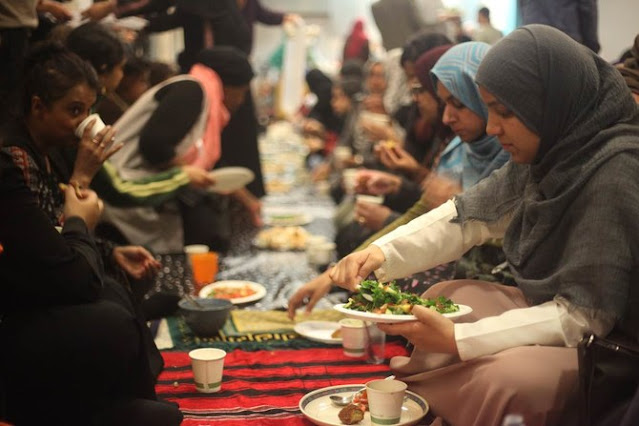Discover the principles and significance of Halal food in Islamic dietary practices
**Introduction**
Eating is not merely a biological necessity but also a deeply ingrained cultural and spiritual practice in Islam. The way one consumes food is considered an act of worship, reflecting mindfulness, gratitude, and moderation. In this article, we delve into the various eating styles advocated by Islam and their significance in promoting overall well-being.
**Halal Eating: A Core Principle**
Central to Islamic dietary laws is the concept of halal, which refers to what is permissible or lawful. Muslims are instructed to consume only halal foods, avoiding anything that is haram (forbidden). This practice extends beyond religious observance to encompass ethical and hygienic considerations, promoting both spiritual and physical purity.
**Sunnah Eating Habits**
The Sunnah, or the teachings of Prophet Muhammad, provides invaluable guidance on various aspects of life, including eating habits. According to his teachings, moderation is key, as exemplified by the practice of eating in moderation and not overindulging. Moreover, expressing gratitude before and after meals is emphasized, fostering mindfulness and appreciation for divine sustenance.
**Fasting: Beyond Abstaining from Food**
Fasting during the month of Ramadan is one of the Five Pillars of Islam and holds profound significance for Muslims worldwide. Beyond abstaining from food and drink from dawn till dusk, fasting encourages self-discipline, empathy for the less fortunate, and spiritual reflection. It also offers numerous health benefits, such as detoxification, improved metabolic health, and heightened mental clarity.
**Tayyib: The Quality Factor**
In addition to being halal, food in Islam is encouraged to be tayyib, meaning pure, wholesome, and of good quality. This principle emphasizes the importance of choosing nutritious and ethically sourced food that nourishes the body and soul. By prioritizing tayyib foods, Muslims uphold principles of health, sustainability, and ethical consumption.
**Prohibited Foods: Understanding Haram**
Islam prohibits certain foods and drinks deemed impure or harmful to one's well-being. These include intoxicants, such as alcohol and drugs, as well as foods derived from prohibited animals, such as pork and blood. The prohibition of haram foods is rooted in divine wisdom, aiming to safeguard the physical, mental, and spiritual health of believers.
**Balanced Diet in Islamic Perspective**
Islamic teachings advocate for a balanced diet that encompasses a variety of foods from different food groups. Moderation is key, as excessive consumption can lead to health issues and spiritual imbalance. By following Islamic dietary guidelines, individuals can maintain optimal health while honoring their religious commitments.
**Mealtime Etiquette**
Mealtime etiquette in Islam emphasizes the importance of mindfulness, gratitude, and communal sharing. Before starting a meal, Muslims say Bismillah (In the name of Allah) to acknowledge the blessings bestowed upon them. Afterward, expressing gratitude through phrases like Alhamdulillah (All praise is due to Allah) reinforces the spiritual significance of eating as an act of worship.
**Community and Social Aspects of Eating**
Eating together with family and community members is highly encouraged in Islam, fostering bonds of kinship and solidarity. Sharing meals not only strengthens social ties but also promotes empathy, generosity, and mutual support. In Islam, food is seen as a means of bringing people together and nurturing relationships.
**Seasonal and Local Eating**
Islam encourages the consumption of seasonal and locally sourced foods, aligning with principles of environmental sustainability and health. Eating foods that are in season not only ensures freshness and flavor but also supports local farmers and reduces carbon footprint. By embracing seasonal eating, Muslims uphold stewardship of the Earth and promote ecological balance.
**Avoiding Food Waste**
Islam condemns extravagance and wastefulness in all aspects of life, including food consumption. Muslims are encouraged to be mindful of their food intake, avoiding excess and appreciating the blessings of sustenance. Practical measures such as meal planning, proper storage, and sharing leftovers with those in need help reduce food waste and promote responsible consumption.
**Health Benefits of Islamic Eating Styles**
Research suggests that adhering to Islamic eating styles can have numerous health benefits, including improved digestion, weight management, and reduced risk of chronic diseases. The emphasis on moderation, wholesome ingredients, and mindful eating practices aligns with contemporary dietary recommendations for optimal health and well-being.
**Mental and Spiritual Well-being**
The connection between dietary habits and mental well-being is underscored in Islamic teachings. By fostering mindfulness, gratitude, and moderation in eating, Muslims cultivate a sense of inner peace.






Post a Comment